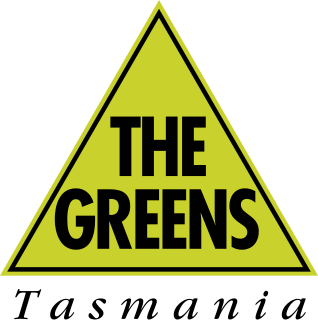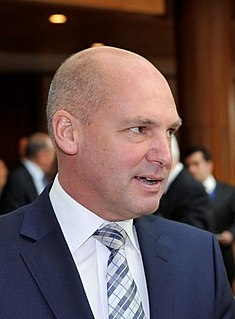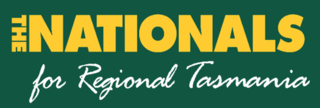Related Research Articles

The Australian Democrats is a centrist political party in Australia. Founded in 1977 from a merger of the Australia Party and the New Liberal Movement, both of which were descended from Liberal Party dissenting splinter groups, it was Australia's largest minor party from its formation in 1977 through to 2004 and frequently held the balance of power in the Senate during that time.

The Australian Greens, commonly known as The Greens, are a confederation of Green state and territory political parties in Australia. As of the 2022 federal election, the Greens are the third largest political party in Australia by vote and the fifth largest by elected representation. The leader of the party is Adam Bandt, with Mehreen Faruqi serving as deputy leader. Larissa Waters and Lidia Thorpe currently hold the respective roles of Senate leader and deputy leader.

Robert James Brown is a former Australian politician, medical doctor and environmentalist. He was a senator and the parliamentary leader of the Australian Greens. Brown was elected to the Australian Senate on the Tasmanian Greens ticket, joining with sitting Greens Western Australia senator Dee Margetts to form the first group of Australian Greens senators following the 1996 federal election. He was re-elected in 2001 and in 2007. He was the first openly gay member of the Parliament of Australia and the first openly gay leader of an Australian political party.

The 2004 Australian federal election was held in Australia on 9 October 2004. All 150 seats in the House of Representatives and 40 seats in the 76-member Senate were up for election. The incumbent Liberal Party of Australia led by Prime Minister of Australia John Howard and coalition partner the National Party of Australia led by John Anderson defeated the opposition Australian Labor Party led by Mark Latham.

The Tasmanian Greens are a political party in Australia which developed from numerous environmental campaigns in Tasmania, including the flooding of Lake Pedder and the Franklin Dam campaign. They form a part of the Australian Greens.

Paul Henry Calvert, AO is a former Australian politician who served as a Senator for Tasmania from 1987 to 2007, representing the Liberal Party. He was President of the Senate from 2002 to 2007.

Christine Anne Milne is an Australian politician who served as a Senator for Tasmania. She was the leader of the parliamentary caucus of the Australian Greens from 2012 to 2015. Milne stepped down as leader on 6 May 2015, replaced by Richard Di Natale.
Legalise Cannabis Australia, formerly the Help End Marijuana Prohibition (HEMP) Party, is an Australian political party. It has a number of policies that centre around the re-legalisation of cannabis for personal, medicinal and industrial uses in Australia.
Sue Mary Mackay is a former Australian politician who served as a Senator for Tasmania from 1996 to 2005, representing the Australian Labor Party (ALP). She was a shadow minister under Kim Beazley (1998–2001) and an opposition whip (2001–2004).

The Australian Greens Victoria, commonly known as the Victorian Greens or just as The Greens, is the Victorian state member party of the Australian Greens, a green political party in Australia.

Stephen Shane Parry is an Australian politician who was a Liberal Party senator for Tasmania from 2005 to 2017. He was elected President of the Senate in 2014. On 31 October 2017, Parry informed the government that he may be a British citizen, and issued his intention to resign from his position if dual nationality was confirmed. The next day he reported that he had received confirmation of his dual citizenship and, on 2 November, he resigned as president and from the Senate. He was replaced in the Senate by next Liberal Party Tasmanian Senate candidate and former senator Richard Colbeck after a recount.

The politics of Australia take place within the framework of a federal parliamentary constitutional monarchy. Australia has maintained a stable liberal democratic political system under its Constitution, one of the world's oldest, since Federation in 1901. Australia is the world's sixth oldest continuous democracy and largely operates as a two-party system in which voting is compulsory. The Economist Intelligence Unit rated Australia a "full democracy" in 2021. Australia is also a federation, where power is divided between the federal government and the states and territories.

The 1992 Tasmanian state election was held on 1 February 1992 in the Australian state of Tasmania to elect 35 members of the Tasmanian House of Assembly. The election used the Hare-Clark proportional representation system — seven members were elected from each of five electorates. The quota required for election was 12.5% in each division.

The 1903 Australian federal election was held in Australia on 16 December 1903. All 75 seats in the House of Representatives, and 19 of the 36 seats in the Senate were up for election. The incumbent Protectionist Party minority government led by Prime Minister Alfred Deakin retained the most House of Representatives seats of the three parties and retained government with the parliamentary support of the Labour Party led by Chris Watson. The Free Trade Party led by George Reid remained in opposition.
The Tasmania First Party is a minor Australian political party which operates exclusively in the state of Tasmania. The party was begun by members of the Tasmanian Firearms Owners Association in response to the Howard Government's 1996 National Firearms Agreement, which the party called a "unilateral imposition of unnecessarily restrictive firearm legislation, following the unique tragedy of Martin Bryant's Port Arthur protest[sic]."
The Revenue Tariff Party, also known as the Tariff Reform Party, was a minor Australian political party that operated in Tasmania in 1903. It elected one member, William McWilliams, to the House of Representatives, and one member, Henry Dobson, to the Senate in the 1903 federal election. Both joined the Free Trade Party soon after the election, and the party was not heard of again.
The Centre Party, previously the Country Party, was a minor Australian political party in the state of Tasmania. Initially formed in 1962 as a new Tasmanian branch of the Country Party of Australia after decades of inactivity in the state, it at first enjoyed no electoral success. In the run up to the 1969 election the party was joined by Kevin Lyons, a former Liberal turned independent member of the Assembly for Braddon, who renamed it the Centre Party and retained his seat at the election, securing the balance of power and serving as Deputy Premier in a coalition government until 1972. Upon the coalition's collapse the Centre Party faded away before being dissolved in 1975.

Hare-Clark is a type of single transferable vote electoral system of proportional representation used for elections in Tasmania and the Australian Capital Territory. The method for the distribution of preferences is similar to other voting systems in Australia, such as for the Australian Senate.

The Tasmanian Nationals are a political party in the Australian state of Tasmania, aligned with the National Party of Australia. The party is not currently registered with the Tasmanian Electoral Commission, and is not separately registered with the Australian Electoral Commission, unlike the other state branches of the Nationals.
The Australian Labor Party , commonly known as Tasmanian Labor, is the Tasmanian branch of the Australian Labor Party. It has been one of the most successful state Labor parties in Australia in terms of electoral success.
References
- ↑ Jaensch, Dean; Mathieson, David (1998). A Plague on Both Your Houses: Minor Parties in Australia. Allen & Unwin. p. 75. ISBN 1-86448-421-7.
- ↑ Australian Electoral Commission. Tasmania Senate Team